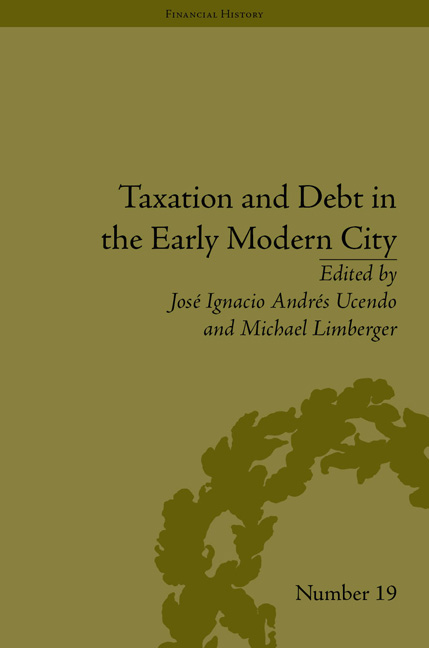Book contents
- Frontmatter
- CONTENTS
- Acknowledgements
- List of Contributors
- List of Figures and Tables
- Introduction
- 1 From Private to Public Management: Tax Farming and Customs Duties in Rome (1630–1700)
- 2 From Taxation to Indebtedness: The Urban Fiscal System of Milan during the Austrias Domination (1535–1706)
- 3 The Urban Tax System in the Kingdom of Naples (Seventeenth to Eighteenth Centuries)
- 4 Public Institutions, Local Politics and Urban Taxation in Seventeenth-Century Aragon
- 5 Taxation and Debt in the Early Modern Castilian Cities: The Case of Seventeenth-Century Madrid
- 6 Tax Collection in Spain in the Eighteenth Century: The Case of the ‘Décima’
- 7 Finances, the State and the Cities in France in the Eighteenth Century
- 8 The Making of the Urban Fiscal System of Antwerp until 1800: Excises, Annuities and Debt Management
- 9 The Dutch Financial System between Public and Private Interests: Urban Debt (1500–1700)
- 10 The Urban Fiscal System in the Habsburg Monarchy: The Case of the Austrian Hereditary Lands in the Sixteenth to Eighteenth Centuries
- 11 Taxation and Debt in Early Modern German Cities
- Notes
- Works Cited
- Index
11 - Taxation and Debt in Early Modern German Cities
- Frontmatter
- CONTENTS
- Acknowledgements
- List of Contributors
- List of Figures and Tables
- Introduction
- 1 From Private to Public Management: Tax Farming and Customs Duties in Rome (1630–1700)
- 2 From Taxation to Indebtedness: The Urban Fiscal System of Milan during the Austrias Domination (1535–1706)
- 3 The Urban Tax System in the Kingdom of Naples (Seventeenth to Eighteenth Centuries)
- 4 Public Institutions, Local Politics and Urban Taxation in Seventeenth-Century Aragon
- 5 Taxation and Debt in the Early Modern Castilian Cities: The Case of Seventeenth-Century Madrid
- 6 Tax Collection in Spain in the Eighteenth Century: The Case of the ‘Décima’
- 7 Finances, the State and the Cities in France in the Eighteenth Century
- 8 The Making of the Urban Fiscal System of Antwerp until 1800: Excises, Annuities and Debt Management
- 9 The Dutch Financial System between Public and Private Interests: Urban Debt (1500–1700)
- 10 The Urban Fiscal System in the Habsburg Monarchy: The Case of the Austrian Hereditary Lands in the Sixteenth to Eighteenth Centuries
- 11 Taxation and Debt in Early Modern German Cities
- Notes
- Works Cited
- Index
Summary
A survey of the fiscal system of the early modern German Cities has to be undertaken with an important restriction in mind: given the scarce literature on the subject, a comprehensive description of taxation and debt in the cities of the Holy Roman Empire is beyond the scope of this paper. It is not without good reason that in the volume on the ‘The Rise of the Fiscal State in Europe, c. 1200–1815’ a chapter treating the Empire in early modern times is missing. Therefore, this essay is rather an account of a research agenda than an analysis of the municipal taxes and debts from the sixteenth to the eighteenth centuries in German cities. We can only present some general trends of urban tax and debt policies, since many developments followed different or even opposed courses as a result of the high number of princely states within the Empire, and the analysis of the individual cases is rendered still more complex by the fact that most cities did not have a single town account. For these reasons we present first and foremost examples of different municipal tax and debt policies in a sample of German cities of the time.
A fundamental distinction has to be made between imperial cities and territorial cities. In the imperial cities, taxes already had a long tradition, justified by the principle of joint obligation (Mitleiden) of all citizens and residents.
- Type
- Chapter
- Information
- Taxation and Debt in the Early Modern City , pp. 181 - 196Publisher: Pickering & ChattoFirst published in: 2014



